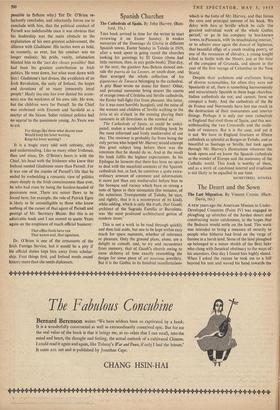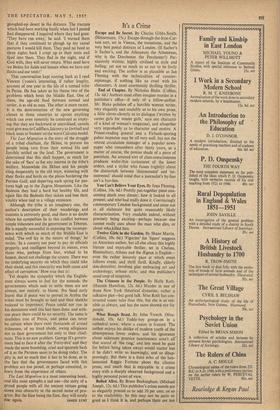The Desert and the Sown .
A FEW years ago the American Mission to Under- Developed Countries (Point IV) was engaged in ploughing up stretches of the Jordan desert and constructing water catchments, in the hopes that the Bedouin would settle on the land. This work was intended to bring a measure of security to people who hitherto had lived on the verge of famine in a harsh land. Some of the land ploughed up belonged to a minor sheikh of the Beni Sakr who clung with fanatical obstinacy to the ways of his ancestors. One day 1 found him highly elated. When I asked the reason he took me to a hill beyond his tent and waved his hand towards the
ploughed-up desert in the distance. The tractors which had been working busily when last I passed had disappeared. I inquired where they had gone. `They have run away,' he said. 'I warned them that if they continued to plough up my camel pastures I would kill them. They paid no heed so three nights back I crept up to their tents and fired into Them. They fled in the night, and if God wills, they will never return. What need have we Bedou for fields and houses when we have our flocks and our tents!'
That conversation kept coming back as I read Vincent Cronin's interesting, if rather lengthy,
account of one year in the life of a nomad tribe in Persia. He has taken as his theme two of the problems which beset the Middle East. One of them, the age-old feud between nomad and settler, is as old as man. The other is more recent. It is the determination of the new governing . classes in those countries to uproot anything which can even remotely be construed as imply- ing that they are backward or uncivilised; camels must give way to Cadillacs, falconry to football and black tents to `bustees' on the worst Calcutta model.
The Last Migration is the story of the struggle of a tribal chieftain, the Ilkhan, to prevent his people being torn from their nomad life and forcibly settled on the land. The government is determined that this shall happen, as much for the sake of 'face' as for any interest in the tribe's welfare. Meanwhile the Ilkhan and his people cling desperately to the old ways, wintering with their flocks and herds on the plains bordering the Persian Gulf, and departing each spring for pas- tures high up in the Zagros Mountains. Like the Bedouin they lead a hard but healthy life, and again like the Bedouin they sicken and lose their vitality when tied to a village existence.
Although the tribe is an imaginary one, the author's description of their wanderings and customs is extremely good, and there is no doubt where his sympathies lie in this conflict between simple tribesmen and the government in Teheran. fle is equally successful in exposing the incompe- tence with which so much of the Middle East is ruled. 'The evil lay in the nature of things,' he writes. 'In a country too poor to pay its officials properly, and intelligent beyond its means, even those who, perhaps from fear, wished to be honest, dared not challenge the system. There was no underlying security on which they could take their stand; and this insecurity was both cause and effect of corruption.' How true that is!
Yet despite the sympathy which the English- man always seems to feel for the nomads, the governments which seek to settle them are not always, nor entirely, to blame. Ibn Saud early learnt that if peace was to prevail in Arabia the tribes must be brought to heel and their sheikhs reduced to impotence. Peace could not run in his dominions until this had been done, and with- out peace there could be no security. The same is doubtless true of Persia, and peace can never be certain when there exist thousands of armed tribesmen, of no fixed abode, owing allegiance not to their government but only to their chief- tains. This is no new problem. George II's govern- ment had to face it after the 'Forty-five' and they made the same bumbling, cruel and ignorant hash of it as the Persians seem to be doing today. The pity is, not so much that it has to be done, as in the fact that the governments faced with this problem are too proud, or perhaps conceited, to learn from the experience of others.
The Last Migration is a most interesting book, and like most epitaphs a sad one—the story of a proud people with all the ancient virtues going down into obscurity in the sacred name of pro- gress. But the East being the East, they will surely











































 Previous page
Previous page